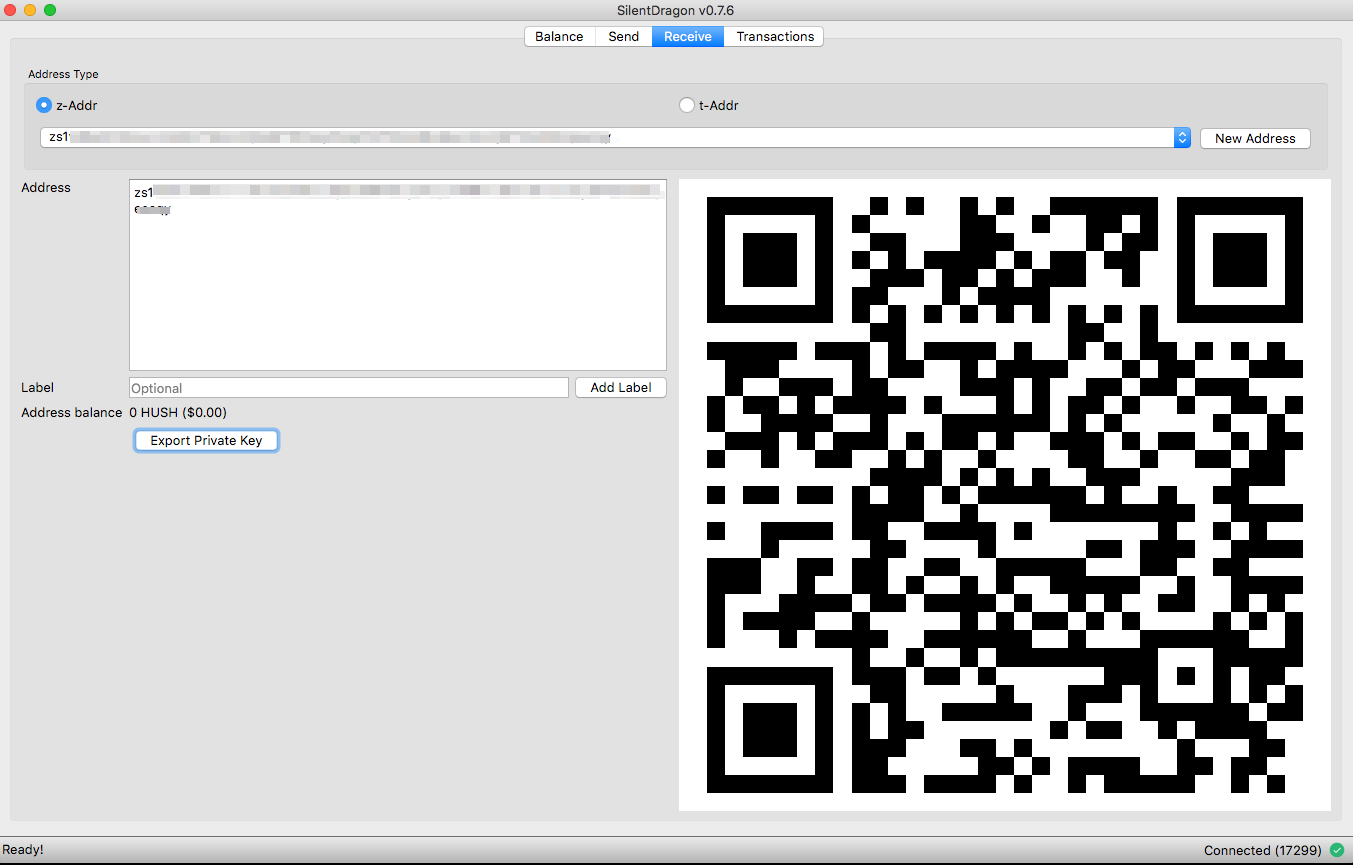|
|
4 years ago | |
|---|---|---|
| docs | 4 years ago | |
| res | 4 years ago | |
| singleapplication | 5 years ago | |
| src | 4 years ago | |
| .gitignore | 5 years ago | |
| .gitmodules | 5 years ago | |
| .travis.yml | 4 years ago | |
| LICENSE | 4 years ago | |
| README.md | 4 years ago | |
| application.qrc | 4 years ago | |
| build.sh | 4 years ago | |
| hush-cli | 4 years ago | |
| run-after-build.sh | 4 years ago | |
| silentdragon.png | 5 years ago | |
| silentdragon.pro | 4 years ago | |
| win-build.sh | 4 years ago | |
README.md
SilentDragon
SilentDragon desktop wallet for HUSH runs on Linux, Windows and macOS. This is experimental software under active development!
PRIVACY NOTICE
SilentDragon contacts a few different external websites to get various bits of data.
* coingecko.com for price data API
* explorer.myhush.org for explorer links
* dexstats.info for address utilities
* wormhole.myhush.org for Wormhole services
This means your IP address is known to these servers. Enable Tor setting in SilentDragon to prevent this, or better yet, use TAILS: https://tails.boum.org/
Installation
Go to the releases page and grab the latest installers or binary. https://github.com/MyHush/SilentDragon/releases
hushd
SilentDragon needs a Hush full node running hushd. If you already have a hushd node running, SilentDragon will connect to it.
If you don't have one, SilentDragon will start its embedded hushd node.
Additionally, if this is the first time you're running SilentDragon or a hushd daemon, SilentDragon will find Sapling params (~50 MB) and configure HUSH3.conf for you.
Pass --no-embedded to disable the embedded hushd and force SilentDragon to connect to an external node.
Compiling from source
SilentDragon is written in C++ 14, and can be compiled with g++/clang++/visual c++. It also depends on Qt5, which you can get from here. Note that if you are compiling from source, you won't get the embedded hushd by default. You can either run an external hushd, or compile hushd as well.
Building on Linux
Ubuntu 18.04 and 20.04:
sudo apt-get -y install qt5-default qt5-qmake libqt5websockets5-dev qtcreator
git clone https://github.com/MyHush/SilentDragon.git
cd SilentDragon
./build.sh linguist # compile translations
./build.sh
./silentdragon
Arch Linux:
sudo pacman -S qt5-base qt5-tools qtcreator qt5-websockets rust
git clone https://github.com/MyHush/SilentDragon.git
cd SilentDragon
./build.sh linguist # compile translations
./build.sh release
./silentdragon
Building on Windows
You need Visual Studio 2017 (The free C++ Community Edition works just fine).
From the VS Tools command prompt
git clone https://github.com/MyHush/SilentDragon.git
cd SilentDragon
c:\Qt5\bin\qmake.exe silentdragon.pro -spec win32-msvc CONFIG+=debug
nmake
debug\SilentDragon.exe
To create the Visual Studio project files so you can compile and run from Visual Studio:
c:\Qt5\bin\qmake.exe silentdragon.pro -tp vc CONFIG+=debug
Building on macOS
You need to install the Xcode app or the Xcode command line tools first, and then install Qt.
git clone https://github.com/MyHush/SilentDragon.git
cd SilentDragon
qmake silentdragon.pro CONFIG+=debug
make
./SilentDragon.app/Contents/MacOS/SilentDragon
Emulating the embedded node
In binary releases, SilentDragon will use node binaries in the current directory to sync a node from scratch. It does not attempt to download them, it bundles them. To simulate this from a developer setup, you can symlink these four files in your Git repo:
ln -s ../hush3/src/hushd
ln -s ../hush3/src/komodod
ln -s ../hush3/src/komodo-cli
The above assumes silentdragon and hush3 git repos are in the same directory. File names on Windows will need to be tweaked.
Support
For support or other questions, join us on Discord, or tweet at @MyHushTeam, or toot at our Mastodon or join Telegram or file an issue.






